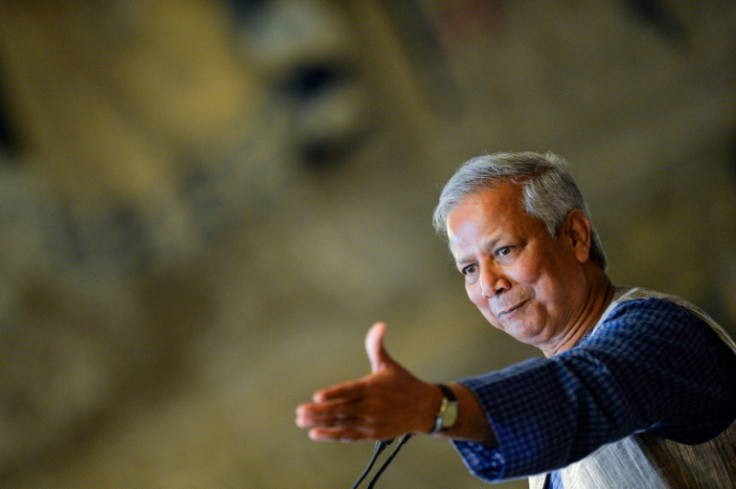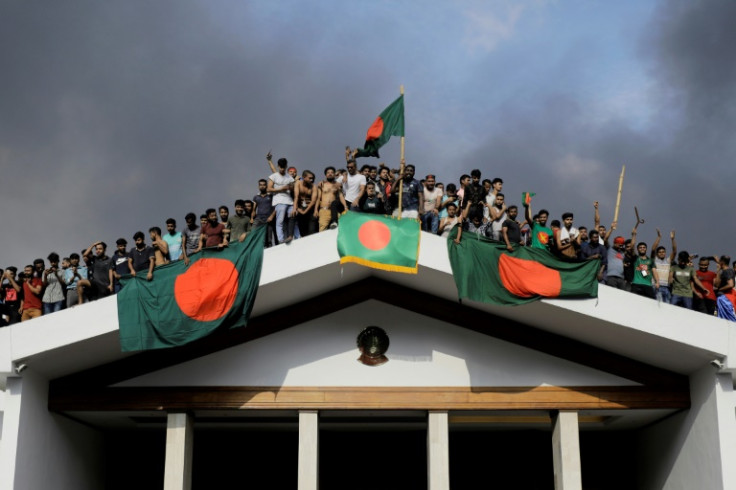Bangladesh Nobel Winner Yunus Tapped To Lead Interim Govt

Bangladesh's Nobel-winning microfinance pioneer Muhammad Yunus has been tapped to lead an interim government after mass protests forced longtime prime minister Sheikh Hasina to flee, the presidency announced early Wednesday.
The appointment came quickly after student leaders called on the 84-year-old Yunus -- credited with lifting millions out of poverty in the South Asian country -- to lead, and he said he was ready to do so.
The decision "to form an interim government with... Yunus as its chief" was taken at a meeting of President Mohammed Shahabuddin, military leaders and the heads of the Students Against Discrimination (SAD) group, Shahabuddin's press office said.
"The president has asked the people to help ride out the crisis. Quick formation of an interim government is necessary to overcome the crisis," it said in a statement, adding that the national police chief had been sacked.
Yunus will have the title of chief advisor, according to SAD leader Nahid Islam.
Shahabuddin agreed that the interim government "will be formed within the shortest time" possible, Islam told reporters.
Hasina, 76, had been in power since 2009 but was accused of rigging elections in January and then watched millions of people take to the streets over the past month demanding her resignation.
Hundreds of people were killed as security forces sought to quell the unrest but the protests grew and Hasina finally fled Monday aboard a helicopter after the military turned against her.
Army chief General Waker-Uz-Zaman said it was "time to stop the violence".
The president dissolved parliament on Tuesday, a key demand of the student leaders and the major opposition Bangladesh National Party (BNP), which has demanded elections within three months.
"If action is needed in Bangladesh, for my country and for the courage of my people, then I will take it," Yunus told AFP in a statement Tuesday, also calling for free elections.
"In Dr. Yunus, we trust," Asif Mahmud, a key leader of SAD, wrote on Facebook.
The military on Tuesday reshuffled several generals, demoting some seen as close to Hasina, and sacking Ziaul Ahsan, a commander of the feared Rapid Action Battalion paramilitary force.
Ex-prime minister and BNP chairperson Khaleda Zia, 78, was also released from years of house arrest, a presidential statement and her party said.
Streets in the capital were largely peaceful Tuesday -- with shops opening and international flights resuming at Dhaka airport -- but government offices remained mostly closed.
Millions of Bangladeshis flooded the streets to celebrate after Hasina's departure -- and jubilant crowds also stormed and looted her official residence.
"We have been freed from a dictatorship", said Sazid Ahnaf, 21, comparing the events to the independence war that split the nation from Pakistan more than five decades ago.
Police said mobs had launched revenge attacks on Hasina's allies and their own officers, and also freed more than 500 inmates from a prison.
Monday was the deadliest day since protests began in early July, and 10 more people were killed Tuesday, taking the death toll overall to at least 432, according to an AFP tally based on police, government officials and hospital doctors.
Protesters broke into parliament and torched TV stations. Others smashed statues of Hasina's father, Sheikh Mujibur Rahman, Bangladesh's independence hero.
Some businesses and homes owned by Hindus -- a group seen by some in the Muslim-majority nation as close to Hasina -- were also attacked.
Bangladeshi rights groups, as well as US and European Union diplomats, have expressed concerns about reports of attacks on religious, ethnic and other minority groups.
Neighbouring India and China, both key regional allies of Bangladesh, have called for calm.
Hasina's government was accused by rights groups of misusing state institutions to entrench its hold on power and stamp out dissent, including through extrajudicial killing of opposition activists.
Mothers of some of the hundreds of political prisoners secretly jailed under Hasina's rule waited outside a military intelligence building in Dhaka on Tuesday.
"We need answers," said campaigner Sanjida Islam Tulee.
The fate of Hasina, now in India, is also uncertain.
A source had said she wanted to go to London but calls by the British government for a UN-led investigation into the violence put that in doubt.
Thomas Kean from the International Crisis Group said the new authorities faced daunting challenges.
"The interim government... needs to embark on the long task of rebuilding democracy in Bangladesh, which has been so badly eroded in recent years," he said.

© Copyright AFP 2024. All rights reserved.





















